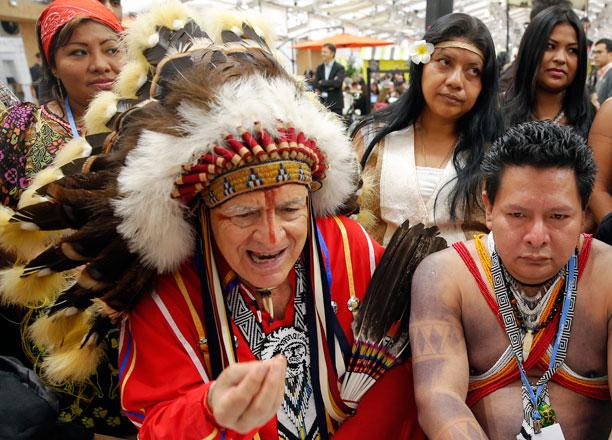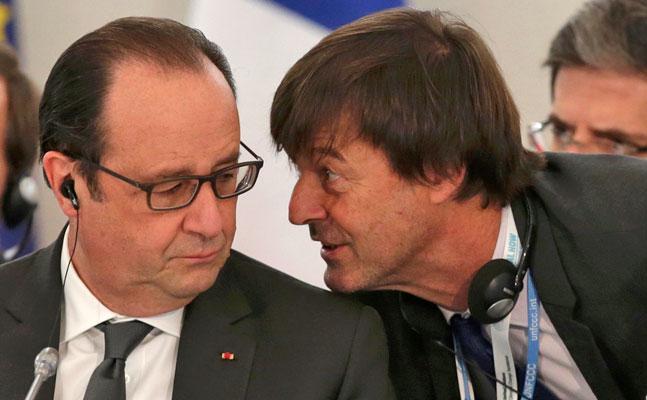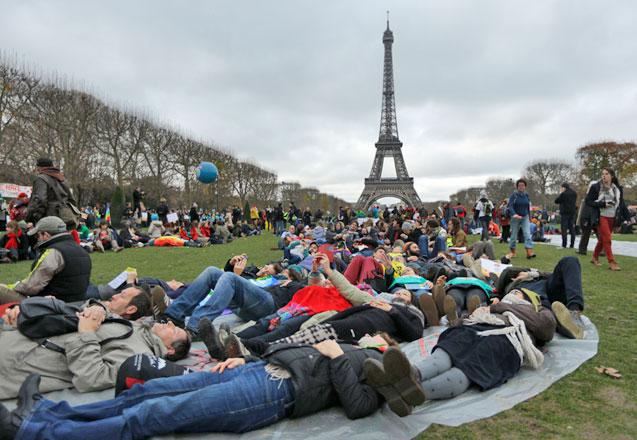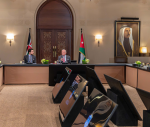You are here
World leaders pledge climate rescue
By AFP - Nov 30,2015 - Last updated at Nov 30,2015
LE BOURGET, France — World leaders vowed Monday to save mankind from catastrophic climate change as an historic summit opened with the "hope of all humanity" laid on their shoulders, but fault lines quickly emerged.
The heads of more than 150 nations — a record — kicked off 12 days of talks in search of an elusive pact that would shift the world economy away from its heavy use of fossil fuels blamed for global warming.
They gathered at a conference centre in Le Bourget on the northern outskirts of Paris, swathed by heavy security following terror attacks in the city which appear to have spurred the push for a climate breakthrough.
"Never have the stakes of an international meeting been so high, because it concerns the future of the planet, the future of life," French President Francois Hollande said in an opening speech.
"The hope of all of humanity rests on all of your shoulders."
Scientists warn that without urgent action to curb greenhouse gases, mankind will suffer worsening droughts, floods, storms and rising seas, threatening millions with hunger, disease and migration. Low-lying island nations would face oblivion.
Monday's event was the largest single-day gathering of heads of state or government in history, the United Nations said, highlighting widespread global commitment to the climate fight.
Many leaders also vowed to forge an ambitious deal in honour of the 130 people killed in the November 13 attacks in Paris, claimed by the Daesh terror group.
The leaders began their talks with a minute of silence to remember the dead.
Bold promises
US President Barack Obama, who flew to Paris on the eve of the conference to pay homage to the victims, made a speech pledging American commitment and urging others to do the same.
"The United States of America not only recognises our role in creating this problem but embraces its responsibility to do something about it," Obama said, as he warned "the hour" of being too late was near.
Obama had earlier met with Chinese President Xi Jinping, bringing together the leaders of the two biggest carbon emitters, to highlight a partnership on climate they began to forge last year.
In his speech, Xi reasserted China's pledge for its carbon emissions to peak by 2030.
But he also insisted rich nations shoulder comparatively more of the responsibility in curbing global warming.
"Addressing climate change should not deny the legitimate needs of developing countries to reduce poverty and improve their people's living standards," Xi said.
He demanded rich nations honour their commitment, dating back to 2009, to mobilise $100 billion a year by to tackle climate change in poorer countries.
The United Nations has hosted annual conferences to address global warming since 1995, but its efforts have stumbled on divisions between rich and poor.
Many poor nations insist rich countries bear the most responsibility for tackling the problem because they have burnt the most fossil fuels since the Industrial Revolution on their way to prosperity.
But the United States and other developed nations argue more must be done by China, India and other emerging giants, which are voraciously burning coal to power their fast-growing economies.
Climate 'justice'
Underscoring the difficulties ahead in Paris, Indian Prime Minister Narendra Modi reiterated his nation's determination to burn increasing amounts of coal and for developed counties to cut back more sharply.
"Justice demands that, with what little carbon we can still safely burn, developing countries are allowed to grow," Modi wrote in a column published in the Financial Times on Monday.
"The lifestyles of a few must not crowd out opportunities for the many still on the first steps of the development ladder."
In his speech to the summit, Zimbabwean President Robert Mugabe lashed out at "miserly" developed nations that wanted to "burden us with cleaning up the mess they themselves have created".
Bolivia's leftwing president, Evo Morales, blasted capitalist greed for setting the planet on a path to doom.
"If we continue on the path trod by capitalism we are condemned to disappear," he warned.
Stumbling blocks in Paris include providing finance for climate-vulnerable and poor countries, and transferring renewable technologies to developing nations.
Scrutiny of commitments to curb greenhouse gases and the legal status of the accord are other expected negotiating battlegrounds.
Still, important progress has been made in the runup to Paris, including a roster of voluntary pledges by 183 nations to reduce greenhouse-gas emissions, and other pro-climate measures.
UN climate chief Christiana Figueres said these provide the architecture for more ambitious efforts that could eventually reach the goal of limiting warming to less than 2oC from pre-Industrial Revolution levels.
'No planet B'
To press world leaders into forging an agreement, more than half a million people participated in climate protests around the world over the weekend.
French authorities had banned protests in Paris due to security fears following the terror attacks.
But thousands of people in Paris gathered to create a 2 kilometre human chain.
Their stand was disrupted, however, when anti-capitalist militants infiltrated the protests, leading to clashes with riot police which saw hundreds of arrests.
Related Articles
LE BOURGET, France — Campaigners on Wednesday pointed a finger at the rich for dangerous warming of the planet as negotiators from 195 natio
PARIS — With encouragement from 150 world leaders ringing in their ears, government negotiators in Paris were on Tuesday left to turn the rh
LE BOURGET, France — Nearly 200 nations adopted the first global pact to fight climate change on Saturday, calling on the world to collectiv















